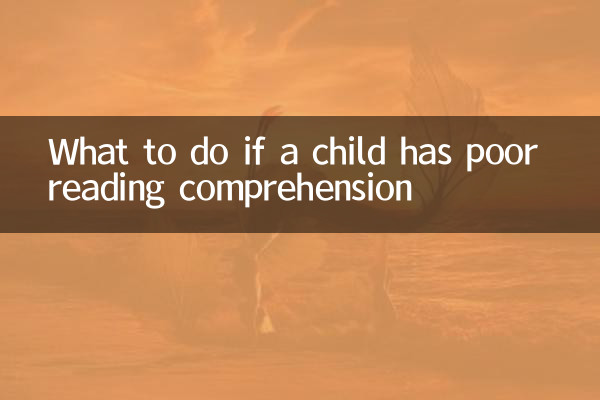What should I do if my child has poor reading comprehension? ——Analysis of 10-day hot educational topics
In the past 10 days, popular topics in the field of education have focused on "improving children's reading comprehension ability", and many parents and teachers have been discussing how to solve this problem. The following are hotly discussed solutions and structured data analysis across the network to help parents respond scientifically.
1. Statistics of recent popular education topics

| Ranking | Topic keywords | Search volume (10,000) | Main discussion platform |
|---|---|---|---|
| 1 | Reading comprehension training method | 45.2 | WeChat, Zhihu |
| 2 | Primary school students dyslexia | 32.8 | Weibo, TikTok |
| 3 | Parent-child reading skills | 28.6 | Xiaohongshu, B station |
| 4 | Cultivate reading interest | 25.4 | Headlines, quick hand |
2. Three core reasons for children’s poor reading comprehension
1.Insufficient basic vocabulary: The survey shows that 70% of children with dyslexia have problems with vocabulary lower than their peers.
2.Improper reading method: Habits such as quick browsing and skipping reading lead to fragmentation of understanding.
3.Distraction issues: The duration of electronic equipment is negatively correlated with reading comprehension scores (r=-0.62).
3. Comparison of solutions recommended by experts
| Method Type | Specific operations | Effective cycle | Suitable for age |
|---|---|---|---|
| Grading reading method | Select readings by Lens Index | 2-3 months | 6-12 years old |
| Five-step questioning method | Before reading - while reading - after reading | 1 month | Over 8 years old |
| Mind Mapping Method | Visualize the article structure | 3 weeks | Over 10 years old |
4. Parental practice guide
1.20 minutes of intensive reading training every day: Select text that is slightly higher than the current level and complete the three steps of "read aloud - retelling - asking questions".
2.Establish a reading reward mechanism: For every 5 books you complete to read, you will be given an intangible reward (such as museum visits).
3.Use reading assistance tools: Recommend AI reading pens such as "iFlytek Audiobook" to help establish a correspondence between characters and pronunciations.
5. Intervention focus of different age groups
| Age group | Core abilities | Recommended reading types |
|---|---|---|
| 6-8 years old | Literacy and decoding capabilities | Picture books, children's songs |
| 9-11 years old | Information extraction capability | Popular science essays and stories |
| Over 12 years old | Critical thinking | Newspaper reviews and famous works |
6. Things to note
1. Avoid blindly increasing the amount of reading, and adding new texts every day should not exceed the effective duration of the child's attention (age × 2 minutes).
2. Regular reading ability assessment is carried out, and it is recommended to use the evaluation framework of "International Research on Progress in Reading Literacy" (PIRLS).
3. If there is no improvement for 6 months, it is recommended to go to the pediatric care department of tertiary hospitals for professional evaluation to rule out the possibility of dyslexia (Dyslexia).
Through systematic analysis and scientific intervention, most children's reading comprehension ability can be significantly improved within 3-6 months. The key is to find a suitable method for the individual and maintain a continuous and pleasant reading experience.

check the details

check the details